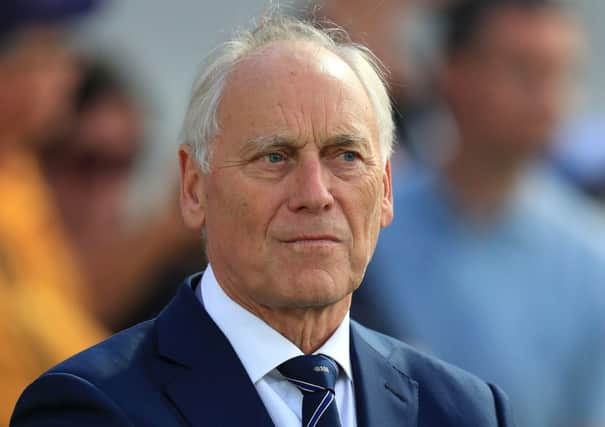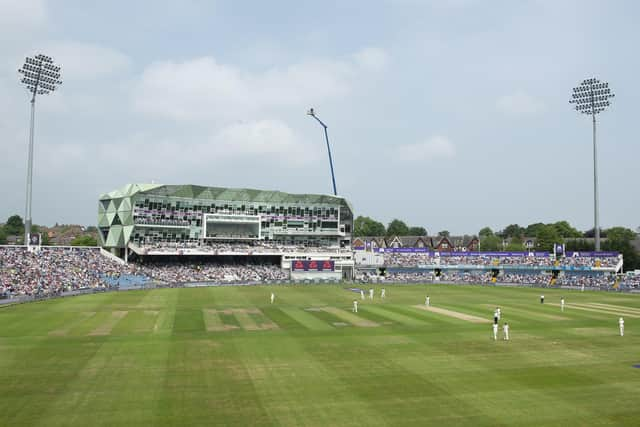Cricket’s debt is ‘unsustainable’ insists former ECB and Yorkshire CCC supremo Colin Graves


The former England and Wales Cricket Board chairman and Yorkshire supremo believes that the game needs to find alternative sources of revenue, particularly in light of projected losses of up to £200m caused by the coronavirus crisis.
His comments come as he starts life with London-based Oakwell Sports Advisory, which aims to solve the key commercial challenges facing sports globally.
Advertisement
Hide AdAdvertisement
Hide AdGraves has joined the company’s advisory board and will bring his wealth of experience and knowledge to bear across all sports – most obviously cricket.


“When you’ve got an English cricket business that relies on 85 per cent of its revenue from broadcasting, that is slightly dangerous in this modern day and age and with everything that’s happening in broadcasting,” said Graves.
“The ECB is going to have to look at something going forward if the broadcasting revenue is not where they anticipate it to be.
“If the broadcasting revenue drops by 20 per cent, 25 per cent, that is a massive hole in the ECB’s revenue. The next four years is ok; they’re currently into a £1.1b broadcasting deal over a five-year period worth £220m a year, which we secured when I was there as chairman.
Advertisement
Hide AdAdvertisement
Hide Ad“They’re basically ok until 2024 because they know what that revenue is, but from 2025 it could be drastically reduced. I think the ECB going forward is going to have to look at what’s out there, what other opportunities there are, and the other big issue that ties in as well is the debt situation of all the big grounds, which has only increased due to Covid-19.
“The debt in cricket is unsustainable; it’s too high for what it is, and the debt is around all the big venues, which have to fund themselves. There’s been no cash input from the ECB over the years, so from that perspective the debt in cricket will have gone up and could be approaching, I would suspect, somewhere in the region of £200m, which is huge when you think the whole ECB annual turnover is about, at tops, £265m. Cricket has some big challenges ahead.”
They are challenges which Graves is keen to continue addressing in his new capacity after ending his five-year stint as ECB chairman in August. He said he was approached in November by Oakwell, which hit the headlines last year when it proposed that the ECB should sell off equity in The Hundred franchises to private investors to help with the game’s cash flow – mirroring an Indian Premier League-style ownership model.
“Oakwell did a report last year and came out with an idea,” said Graves. “I’m not saying that’s what should happen, but I think everything needs to be explored to see what can be done to improve the financial situation of English cricket.
Advertisement
Hide AdAdvertisement
Hide Ad“English cricket needs to look at alternatives. It can’t just sit there and say that broadcasting revenue is the only thing it can rely on. It’s got to look, I believe, at alternatives as well as the broadcasting deal.
“I’m not saying I’ve got the panacea ideas. I just think English cricket has to look forward at what life’s going to be like after the broadcasting deal finishes and how it can improve, basically.
“There’s private investment, there’s Indian investment, there’s investment in the grounds, and so on. Is it really worth the grounds being owned by private members’ clubs with big debts of £20m-£30m? Is there a different way to fund grounds and stadia going forward? I think everybody has to look at everything with a blank sheet of paper.”
Graves believes the Indian market is well worth exploring.
“I believe the Indian market is one we need to be looking at,” he added. “It’s got the clout, it’s got the power, it’s got the money. If you could get into that market you could have Indian players then coming across to play in The Hundred, which would be great. There’s some spin-offs if we do it properly.
“Let’s see what’s achievable.”
Advertisement
Hide AdAdvertisement
Hide AdGraves, who turns 73 this month, is relishing his latest sporting challenge.
“Oakwell is basically a consultancy/advisory company, advising sport in general of different ways and means for capital funding or commercial improvement of the rights, etc,” he said.
“I had a meeting with them and they invited me on to their advisory board. They do sport in general across the world – it’s not just cricket.
“They’ve got nobody in cricket, and that’s why I was attracted to them. The guy they had on cricket, Mike Fordham, left to become chief executive of Rajasthan Royals. They’ve got somebody on football, somebody on racing, somebody on rugby union, so I think they saw me as someone who could help them greatly on the cricket scenario around the world.
Advertisement
Hide AdAdvertisement
Hide Ad“Basically, the modus operandi I’ve got is to look at business, work with business, help businesses and sports to look at how they can improve – not only revenues, but capital into their businesses.
“Look at the future, really, and certainly with everything that’s happened in the last 12 months with Covid-19, then a lot of sports businesses are looking at some black holes appearing.
“It’s an opportune time to be doing it and working with sports.”
Support The Yorkshire Post and become a subscriber today. Your subscription will help us to continue to bring quality news to the people of Yorkshire. In return, you’ll see fewer ads on site, get free access to our app and receive exclusive members-only offers. Click HERE to subscribe.
Comment Guidelines
National World encourages reader discussion on our stories. User feedback, insights and back-and-forth exchanges add a rich layer of context to reporting. Please review our Community Guidelines before commenting.